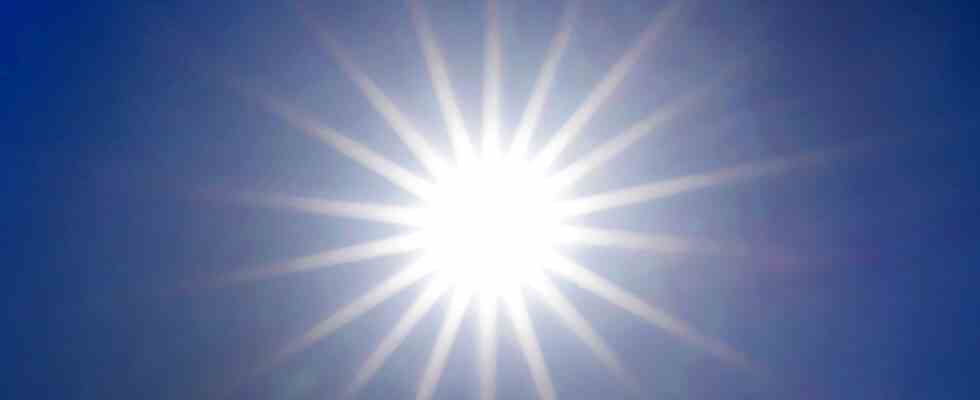interview
Status: 10/16/2022 03:04 a.m
Temperature records shaped this summer. In an interview, environmental physician Claudia Traidl-Hoffmann explains how and why this heat makes people ill. She calls for early warning systems for patients and a transformation of cities.
tagesschau.de: Which aspects of climate change are affecting our health most severely and most severely?
Claudia Traidl-Hoffmann: The worst thing for the body in terms of climate change effects is really the heat. The heat is what bothers us the most, what makes us sick and what really costs lives. In this respect, the heat is the most dangerous. But of course climate change does more than just heat, sick people and heat-related deaths.
To person
Claudia Traidl-Hoffmann heads environmental medicine at the University Hospital in Augsburg. She researches the interaction between the environment and people. One of her core topics is the impact of climate change on the environment and health.
tagesschau.de: What triggers the heat in a body? So what extra work does the body have to do when it gets too hot, and at what point is it possibly overwhelmed?
Traill-Hoffmann: The main task of the body is to keep the core temperature at 37 degrees. And that’s important for the body, for the brain – that’s where we function best. So when it gets hot outside, the body has to expend even more energy. And the first thing that happens is: vessels are widened and that’s why people who are outside and suffer from the heat usually have a bright red face and start sweating. We then try to get rid of the body temperature – through the skin, through the vessels. Then the blood pressure rises. And when the blood pressure rises, the diseased heart is eventually overwhelmed. Or then a vessel in the brain finally bursts and then comes the stroke or then the heart attack. And the important thing is: Of course, this happens with previous illnesses, but it can also happen with completely healthy people.
“City becomes a chemical kit on a hot day”
tagesschau.de: Are people in the city more at risk or people in the country?
Traill-Hoffmann: Especially in the city we have these so-called heat islands. It’s sometimes four or five degrees hotter here than in the country. Then there are other environmental factors in the city. That’s just environmental pollution, from the traffic load, for example. And then a city like Berlin, Hamburg or Munich becomes a chemical construction kit on a hot day. Completely new chemical compounds are created, which then damage our lungs, damage the mucous membrane, damage the skin and then everything gets even worse.
Science editor Anja Martini, NDR, in conversation with Claudia Traidl-Hoffmann, Director of Environmental Medicine at the University Hospital in Augsburg
tagesschau24, 16.10.2022
tagesschau.de: Are there any studies on whether children or adults develop particular diseases?
Traill-Hoffmann: Yes, you are addressing these vulnerable groups. Especially when it comes to diseases caused by climate change or when it comes to heat, we know that small children, but also the elderly and the sick in general, belong to the susceptible, vulnerable groups. And on top of that, we trivialize the heat as an issue. I can only quote from our newspaper, a headline from the summer sports festival: “Mysterious. 20 students collapse.” It was 35 degrees. Why is this puzzling? That means we don’t associate heat with danger, we associate heat with eating ice cream and bathing.
tagesschau.de: There are other problems that climate change can trigger in us – mental problems are one of them?
Traill-Hoffmann: Yes, in fact, climate change is really making you sick from head to toe. We have mental illnesses, such as diseases of the nervous system, Alzheimer’s or multiple sclerosis. These are diseases that get worse during heat waves. Atopic dermatitis, for example, is a disease in which, to put it simply, the skin has holes. It becomes porous from pollutants and the environment that damage the skin. And these people are then more susceptible to developing allergies. Pollen, for example, can then do its work through this perforated skin and set off an allergy.
And now there is the effect of climate change, which is making the pollen season longer. We have more pollen per day, we have more aggressive pollen and we also have new more aggressive pollen. Because of pollution, we simply have more people suffering from allergies.
tagesschau.de: What would have to change in order for us to be able to cope better with the situation?
Traill-Hoffmann: We must do at least two things. First, of course, we have to adapt to climate change. This is called climate resilience, because climate change is here. We need to develop early warning systems for patients. At the same time, however, we must design our cities differently. We need green cities, we need cities with a high level of biodiversity. We need cities that make people healthy or keep them healthy and don’t make them sick. And the second thing is very important: We simply have limits in this adaptation. From a body temperature of 42 degrees life is no longer possible, then we die. This means that at the same time we must also try to mitigate climate change, because otherwise it would not be possible for people to survive.

